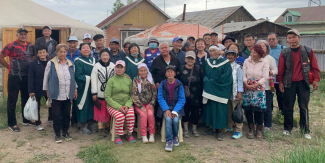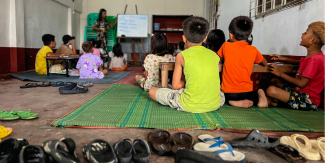Colossians 3:12 says, “Therefore, as God’s choice, holy and loved, put on compassion, kindness, humility, gentleness, and patience.” (CEB)
“Mom, do we have to do this every week? It takes so long!” This is a common question from our 10 and 13-year-old children since our “Stay Home, Stay Safe” order started. My heart has been moved to connect with those in our sphere of influence both in and out of our church community through a simple delivery: cinnamon rolls. Using a simple sourdough starter we received from a neighbor, our children have joined in the work with me each Saturday to knead the bread, pray for the families who will receive them, wait patiently, and of course, lick the frosting bowl.
It has been in the weekly delivery runs that discussions about faith, trust, why we do what we do, doubts, and Christian values have truly surfaced in our home these last two months. The ability to have open and honest conversations with children is a gift, one that takes time and practice, sees mistakes as opportunities to learn, and is filled with mutual respect and trust. It is in this space that I am able to see God at work in tangible ways. Thanks be to God.

Who I am today was also shaped by those who taught me and prayed for me as I grew up in the church. Now, I am compelled by Christ’s love and the invitation be imitators of it. (2 Cor. 5:14) It is because of this compelling love that I am actively looking for ways to partner with Christ in our world through compassion. Just how does someone “put on” compassion? Is that even possible? How do we teach it to children?
In the New Testament, Jesus uses the word compassion when he is referring to the crowds who were following him and without food (Mark 8:2). He shows compassion when he heals the blind men. (Matt 20:24) When he tells the story of the Parable of the Lost Son, the father welcomes his son back with compassion. (Luke 15:20) Each of these examples involves action. People often use the words sympathy, empathy, and compassion interchangeably. But each word carries a distinct identity that invites deeper engagement. Compassion stems out of a need to do something about what is being seen or unseen. In her book, I Thought it was Just Me, Brené Brown writes, “Compassion is not a virtue—it is a commitment. It’s not something we have or don’t have—it’s something we choose to practice.”
“The ability to have open and honest conversations with children is a gift …”
Compassion is cultivated in environments where vulnerability is central. When we are able to freely express our feelings and emotions without fear or judgment and conflict is resolved in honest ways, compassion can take place. This takes practice, intentionality, and prayer. It takes a willingness to take a risk. This can start in our homes with our families. As we intentionally share meals around the table, we connect with one another and can affirm one another and practice acts of compassion through vulnerability and grace-filled discussion.
“Compassion is cultivated in environments where vulnerability is central.”
When our oldest child was diagnosed with a genetic eye cancer, our world changed forever. We saw things we had not seen before. We met people we would never have been able to meet. We shared life and stories with people from all walks of life, and we got to see the Church, moved with compassion, act on our behalf. There were phone calls, texts, emails, meals delivered, our house cleaned and organized, gift cards, visits in the hospital, and so much emotional support. It was real, tangible compassion because it came with action.
As recipients of that compassion, we have spent the last 14 years fighting for ways to be compassionate ourselves. Sometimes it is positioning ourselves in places to be moved with compassion—uncomfortable places, places of brokenness. It is following God’s call to new places, challenging our ideologies and convictions, and making space for one another even when it is so much easier to hide or push others away.
Compassion can be as simple as waving at a neighbor, sending a text, encouraging others on social media, inviting a family over for a meal, or picking up things for your neighbor while out shopping. Compassion can also be big, like answering a call to foster care, advocating for the weak, becoming a listening ear to a survivor, inviting children to help participate in worship services, clothing and feeding of the poor, and providing shelter and structure for your relatives or strangers. Whatever practices you have in place or hope to start, may the Holy Spirit, who is already at work within you and around you, prompt you to practice compassion in the ways for which you were created.
Jayme Lenker is on staff with her husband Keegan (the lead pastor) at the Gig Harbor Church of the Nazarene in Gig Harbor, WA, where she leads children and their families and co-leads the Music Ministry. She is the mother of two, ages 13 and 10, and works as a middle school counselor Monday through Friday. She enjoys walks by the harbor, kayaking, and chai tea lattes.






Add new comment